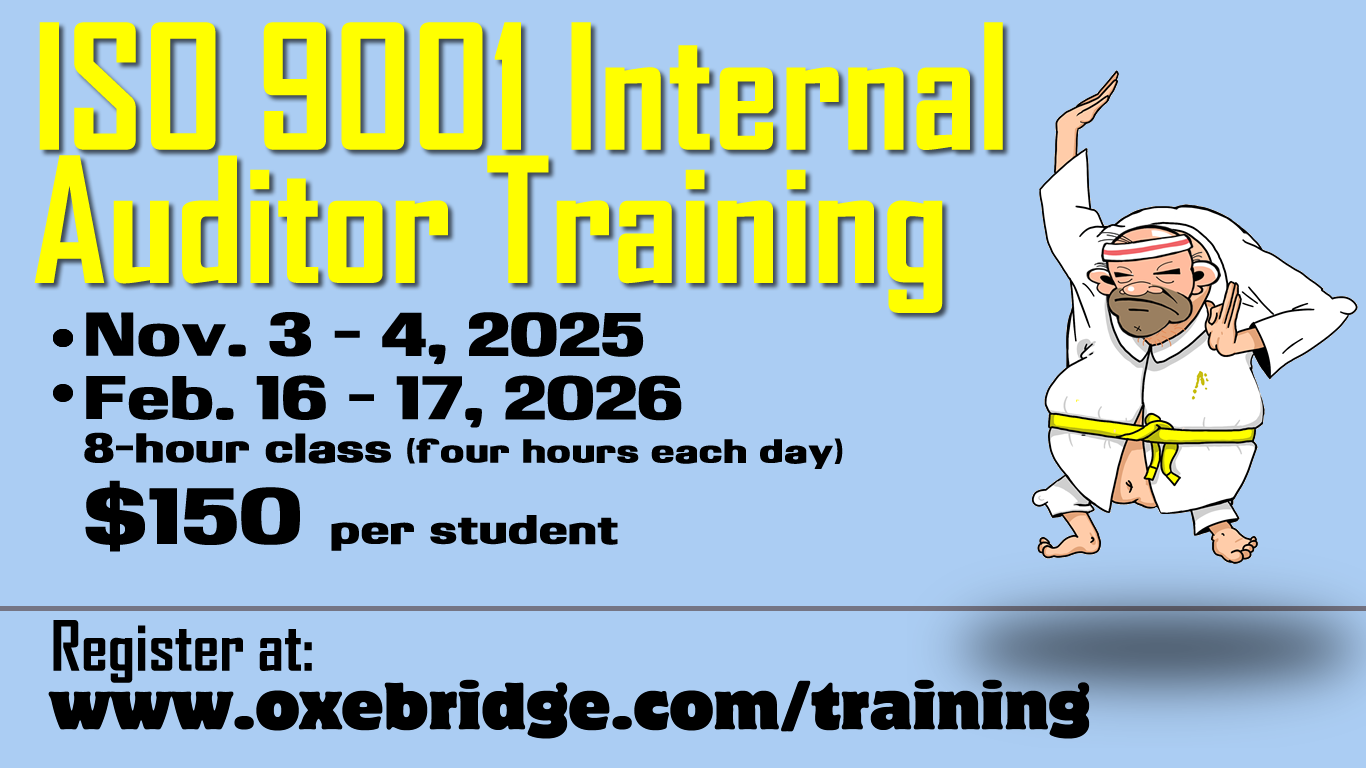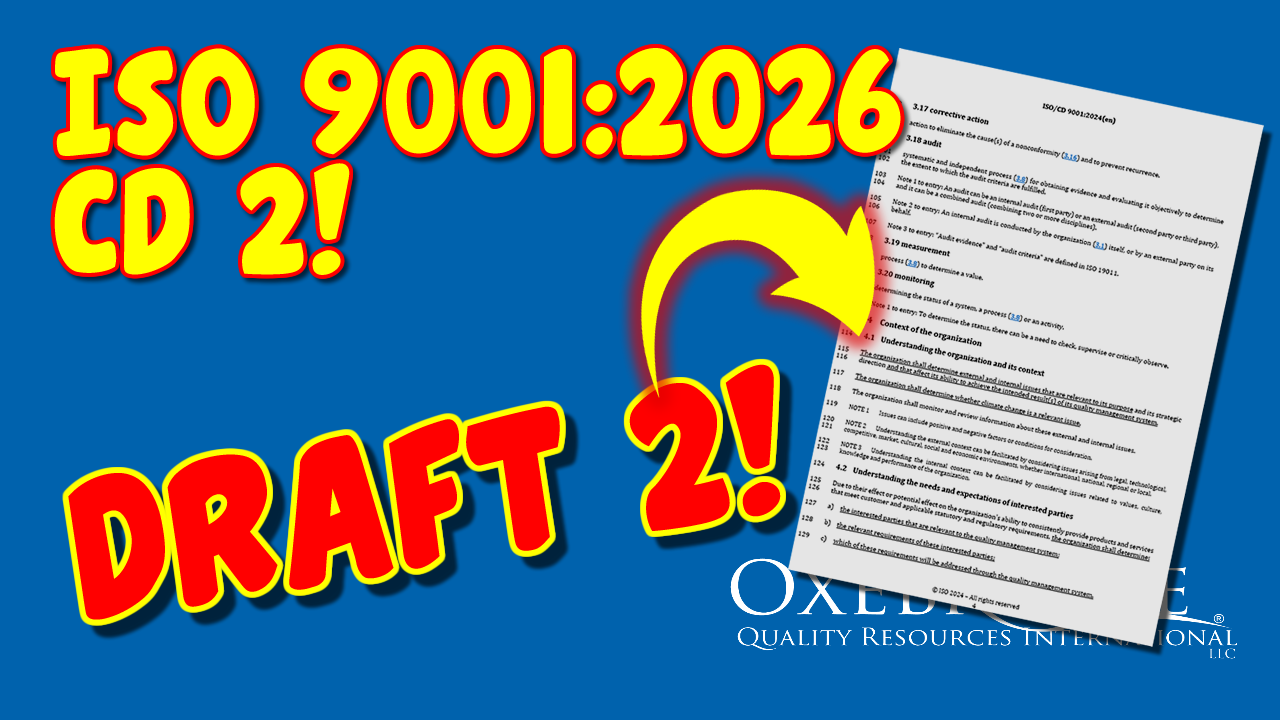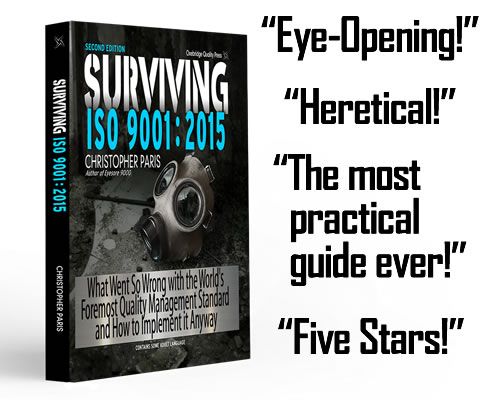 ASQ continues to promote the consultant wing of the US TAG to TC 176, while ignoring users or non-TAG experts, with a new video featuring Paul Kunder, of the consulting firm Ameri-Veritas and certification body Bureau Veritas. Yes, they have the same last name, and I haven’t poked into why that is yet, but I am sure there’s some conflict of interest there that ANAB is ignoring.
ASQ continues to promote the consultant wing of the US TAG to TC 176, while ignoring users or non-TAG experts, with a new video featuring Paul Kunder, of the consulting firm Ameri-Veritas and certification body Bureau Veritas. Yes, they have the same last name, and I haven’t poked into why that is yet, but I am sure there’s some conflict of interest there that ANAB is ignoring.
Anyway, in his video, Kunder takes a surprisingly — if anemic — critical look at ISO 9001:2015, at least saying their work on risk-based thinking didn’t go far enough. But the kudos end there, because whenever you give a CB auditor the microphone, he can’t stop but say something that admits they are lazy and utterly ignorant of their responsibilities under international accreditation rules.
In Kunder’s case, he once again goes to the well of blaming customers for something the CBs themselves wrought. In an otherwise insightful review of the lameness of Quality Manuals, and how they often became mere repetitions of the ISO 9001 standard, Kunder fails to note that it was his own industry — the Certification Bodies — that drove clients to parrot the standard in their manuals. This happened because ISO 9001 auditors want an easy job of checking-off that each ISO 9001 clause was addressed somewhere, and they pushed back against companies who refused to do so. Later in the video, he even admits as much, saying that when he “wears the audit hat” how he prefers to see things in a manual because it makes his job easy. And then even later, as we will see, he accidentally argues for the exact same thing to happen again.
Next, Kunder repeats the ISO meme that risk was already in the standard, when it wasn’t, but he’s at least critical of how TC 176 rolled out Risk-Based Thinking. He also accidentally admits that risk is negative (he calls it “the downside”) and not positive, which contradicts ISO on general, and the whole idea of RBT dealing with both negative risk and positive risk (opportunities.)
Ka-Ching! Ka-Ching!
But what’s really nefarious is how he suggests the Certification Bodies will have to “increase the amount of audit time, more than likely.” Yes, that means more fees for nothing. He justifies this by saying Stage One will require additional planning to offset the lack of documentation, but (ignoring the fact that CB auditors rarely use Stage One to do a document review anyway) if they don’t have to read documents, why can’t they use that time to gather evidence instead?
It’s an accidental, if overt, admission that auditors relied on documentation rather than actually verifying real evidence. That’s the amazing thing about CB auditors: when you get them into even a casual conversation, they can’t help reveal that they are lazy, and are not doing their jobs.
Finally, he also wrongly assigns powers to CBs by saying “standard bodies write standards, and CBs interpret them.” That’s fundamentally incorrect. The client interprets the standard, and the CB has to assess whether or not that interpretation meets the letter of the standard. That’s all they are accredited to do, and it is physically impossible for a CB to interpret the standard in a way that could possibly meet every company in every industry, since every company is different. But under Kunder’s model, the CBs can interpret the standard to whatever implementation method they prefer, and then enforce that interpretation on the clients, even when it disagrees with other CBs.
And that, ladies and gentlemen, is why you saw decades of Quality Manuals that repeated the standard — CBs interpreted this as a requirement, and then enforced it on clients, even though it was never required.
So the Kunder video is a fascinating insight the insulated world in which the CBs operate. Without any understanding that, yes, perhaps they might benefit from listening to clients rather than talking down to them, the CBs continue to steamroll their way through industry, without proper training and without a functioning accreditation scheme to tell them how really, really awful they are.
For the record, I have argued for a price hike in ISO 9001 certification, but only to increase the pay of auditors. The thinking is that by increasing pay, we may be able to attract a better class of auditor, and improve auditor training. CBs resist this because they want the additional funds going to the home office and salaries of execs and sales reps, not the idiot auditors they hire, and who later make videos like this one.
Christopher Paris is the founder and VP Operations of Oxebridge. He has over 35 years’ experience implementing ISO 9001 and AS9100 systems, and helps establish certification and accreditation bodies with the ISO 17000 series. He is a vocal advocate for the development and use of standards from the point of view of actual users. He is the writer and artist of THE AUDITOR comic strip, and is currently writing the DR. CUBA pulp novel series. Visit www.drcuba.world








